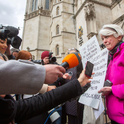The application to the International Criminal Court (ICC) for the arrest and trial of Benjamin Netanyahu, his minister of defence and three Hamas leaders is a huge moment for international law. The prosecutor, Karim Khan, took the precaution of seeking advice from eight distinguished experts (most of whom are based in the United Kingdom), who were unanimously supportive of his decision to pursue the individuals for war crimes and crimes against humanity. But uncertainty remains on multiple levels.
Will the warrants be granted? Approval must be obtained from the judges of the pre-trial chamber of the ICC, and they will need to be satisfied that “there are reasonable grounds to believe that a person has committed a crime within the jurisdiction of the Court and the arrest of that person appears necessary”. After a reorganisation in March, the pre-trial division of the Court is currently composed of six members, with judges Reine Alapini-Gansou (Benin), Socorro Flores Liera (Mexico) and Iulia Motoc (Romania) making up the most likely panel to be involved in the Israel/Hamas decision. If the warrants are denied this would most likely precipitate a crisis within the whole system, given the evident care and caution the prosecutor has brought to framing his case, and the relatively low bar of the “reasonable grounds” stipulation before warrants can be issued.
International law, long viewed as the servant of power, is developing its own autonomy
There are further procedural questions. Are the political and military leadership in a state that has not signed up to the ICC—such as Israel—lawfully to be treated in this way? The court says yes, with Netanyahu and the defence minister Yoav Gallant vulnerable on account of an earlier ruling that Israel’s conduct within Palestine brought it under the court’s remit. (Palestine has already signed up.) But can the current leader of a government be subject to a warrant for his or her arrest? Again the court says yes, the cases against President al-Bashir of Sudan and Charles Taylor of Liberia being the legal authorities (albeit this lack of immunity remains controversial).
Then there is the practical effect of the ICC’s move. If warrants are issued, will any of the five men be arrested? The 124 state parties to the Rome Statute of the ICC will be obliged to arrest them if they turn up within their countries, but that still leaves quite a few boltholes: the US for the Israelis (as well as Israel itself of course), Qatar and Iran for Hamas. And if arrested, will any of them be successfully convicted? The court operates on the presumption of innocence, with proof being required “beyond reasonable doubt” of which it has to be “convinced”.
A question that is often central to international law is whether an intervention will impede the chances of an early end to violence in the region. The Hamas leaders are probably fairly indifferent to the ICC, and so their strategic position is unlikely to be affected by it. Netanyahu and the government he leads are in a different, altogether more vulnerable position. It is possible that the warrants will be a last straw, leading to the collapse of an already embattled administration—one whose civilised exterior has been rent asunder by the cumulative legal consequences of its actions in Gaza. Netanyahu may be aware that it is not unusual for those who end up in ICC custody to have been turned in by their own countries, a useful way for new regimes to mark a break with the past. It is no longer only domestic criminal proceedings that he has to worry about.
The extraordinary impact of what is, in one sense, a technical procedural move can be seen in the reaction. The US president has denounced the prosecutor for his “outrageous” implication of equivalence between Israel and Hamas, while Netanyahu has called the decision a “moral outrage of historic proportions”, one made by one of the “great antisemites in modern times”. Like the proceedings under the entirely separate Genocide Convention currently before the International Court of Justice (ICJ)—which have now produced a dramatic demand for the immediate cessation of the Israeli military offensive in Rafah—the fact of court proceedings (or, in the ICC’s case, the mere initiation of a process that might lead to such proceedings) is a huge event in a way that is quite separate from whatever their outcomes might eventually be. In a world of post-truth, where assertions are amplified into supposed facts by the power of those making them and when even what we see with our own eyes is subverted by the distortion that swirls around it, law stands out as an old-fashioned exception to what has become the norm. Law retains a commitment to facts that is compelling precisely because it seems to come from another era—it is a holdover from a time when truth mattered, and when it was not ridiculous to think it could be established.
Finally, there is the shifting balance of power. From its inception, international law has been viewed as largely the servant of power: colonial, imperial, and more recently that of the global north. Those currently in custody awaiting trial at the ICC are all African, and those for whom warrants have been issued but who have so far escaped the clutches of the court are also overwhelmingly from that continent.
The current proceedings before the ICC show that that this regional focus is no longer inevitable. International law has been developing its own institutional autonomy, its staff and judges believing in the global idea that underpins their mandates. The powerful states that created these international bodies made the mistake of believing that their universal jurisdiction could be safely conceded because it would never be turned on them. No more. Law commands its own loyalties according to rules, not rulers.














